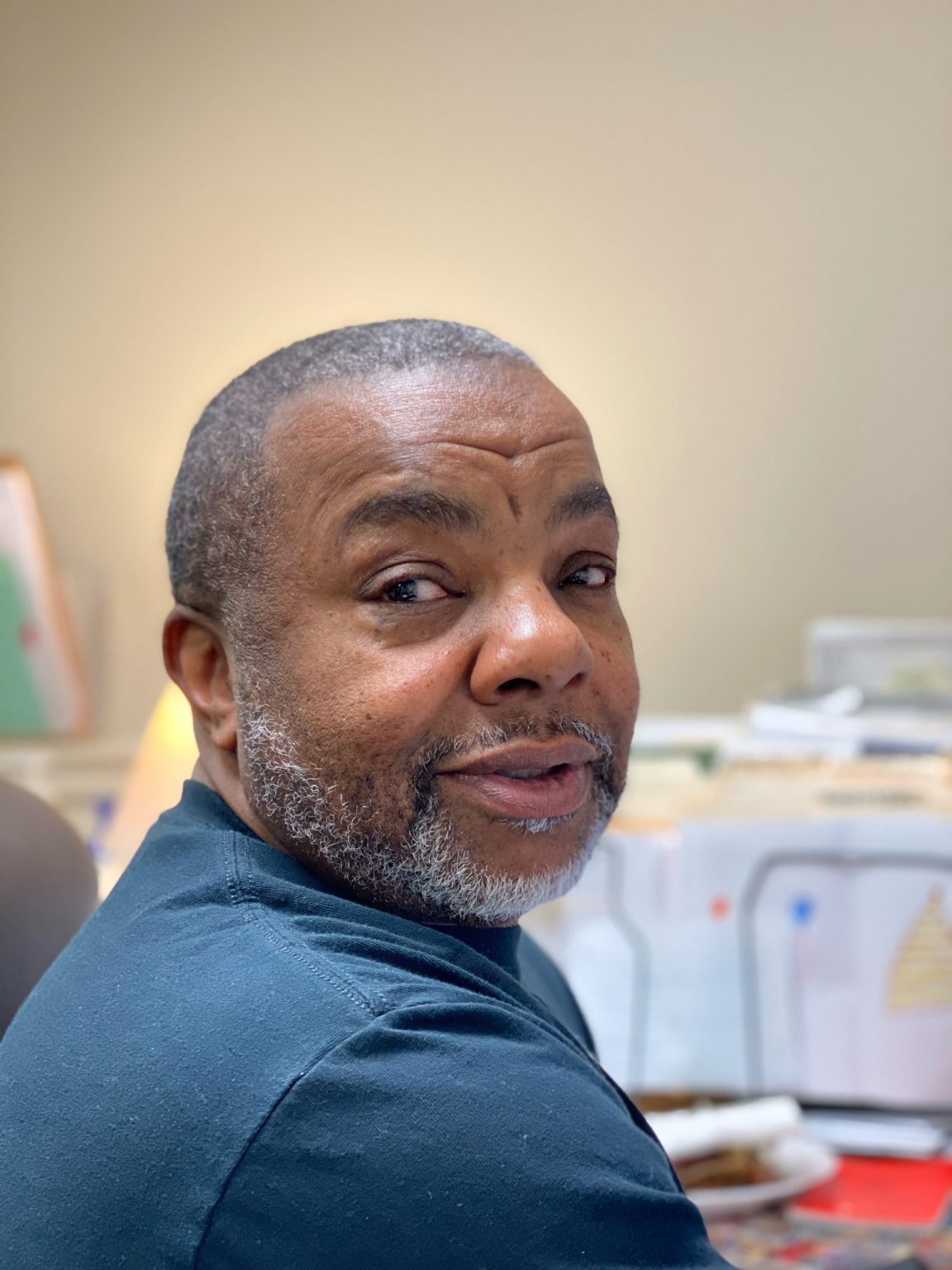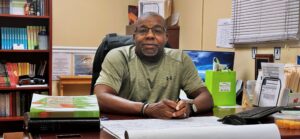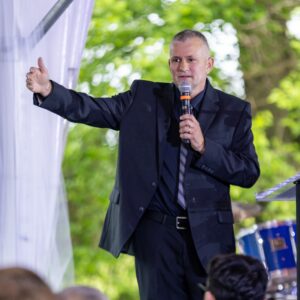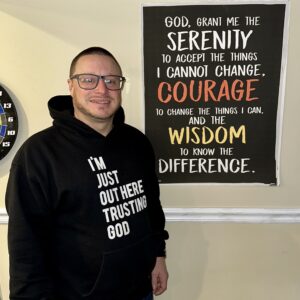My name is Carlton Hill and I am the Changed Life Recovery Program Director at The Frederick Rescue Mission. I came to this very program a s a participant in 2003 from Washington, DC where I was a promising chef, but instead became hopelessly homeless and addicted to drugs. During my time in the CLRP and after many attempts to get off drugs, I renewed my relationship with Jesus Christ. I graduated from the program and had a determination never to return to the destructive lifestyle that repeatedly took so much from me.
s a participant in 2003 from Washington, DC where I was a promising chef, but instead became hopelessly homeless and addicted to drugs. During my time in the CLRP and after many attempts to get off drugs, I renewed my relationship with Jesus Christ. I graduated from the program and had a determination never to return to the destructive lifestyle that repeatedly took so much from me.
I enrolled at Frederick Community College to sharpen my culinary skills as I worked part time at Brewers Alley Restaurant, but God had a plan. A counselor gave me an education track for counselor instead of culinary, and when I wanted to point out the mistake, I couldn’t. It was as if the culinary field, with all its social aspects, was also part of the past that I had to leave behind. And so, I did.
Even with my life seemingly heading in the right direction, I continued to suffer loss. My wife divorced me, and my only son was murdered. Even though I struggled tremendously through all of that, I had Jesus this time and I eventually graduated with high honors – a 3.89 GPA and an associate degree in counseling and human services.
Fast forward, the Peer Recovery Program was a growing project in the recovery field, developed to combat the exploding opiate addiction that was overwhelming the hospital emergency rooms at an alarming rate. I was working at The Frederick County Health Department as a Community Outreach Worker when they initiated a Peer Recovery Pilot Program at the Frederick Memoria l Hospital. I was selected to work in the hospital’s ER, providing recovery resources to those who frequented the ER suffering with addictions and attempting to curtail recidivation, which was creating a large expense for the hospital. The program was a success, and I became Frederick County’s first Board Certified Peer Recovery Specialist!
What is Peer Recovery?
Wikipedia states:
“A peer support specialist is a person with ‘lived experience’ who has been trained to support those who struggle with mental health, psychological trauma, or substance use. Their personal experience of these challenges provides peer support specialists with expertise that professional training cannot replicate.”
The key to this definition is “lived experienced”. The ERs were overwhelmed with the opioid pandemic and the professional staff were perplexed about what to do. This was not because of lack of education (well, some of it was), but because of lack of communication! Someone with lived experience, who walked the walk, felt the pain of loss and despair, and made it through community resources can connect with a person suffering from addiction and offer hope.
To a person suffering from addiction or alcoholism, a Peer Recovery Specialist advocates for multiple pathways to recovery/wellness. They have an ethical responsibility to recognize risk indicators that may affect the individual’s welfare and safety, they serve as a role model for an individual, and they use person-centered language. The Peer Recovery Program today has evolved into a paid position and is recognized state-to-state by the Board of Mental Health and Hygiene. Peer Recovery Specialists are assisting professionals in the court systems, jails, mental institutions, clinics, and hospitals across the country.
Peer Recovery in the CLRP
Now, as Director of the Changed Life Recovery Program and a Peer Recovery Specialist, it has been challenging to face the stigma that people ignorantly have towards the residents or other people in recovery. While recovery provides opportunities, makes a person stronger, gives purpose and meaning to lives, and leads to social acceptance, an entrenched stigma reduces opportunities, reduces self-esteem and self-efficacy, reduces the belief in one’s own abilities, and contributes to social exclusion through  discrimination.
discrimination.
One goal is to educate the residents about their worth, and to emphasize to the staff that language matters! In the CLRP we are raising up peer recoverees that need to find their identity. We know that some people mean well but looking through the eyes of society we are often stigmatized because of the life we once lived and are trying to break away from. I hear the use of words like addict, alcoholic, relapse, user, dirty urine, etc. For a long time, we’ve known that language plays a huge role in how we think about people and how people think about themselves. Words must change so that attitudes can change.
Not only should we offer hope through Jesus Christ, we offer hope through words. The Bible says, “Wise speech is rarer and more valuable than gold and rubies” (Proverbs 20:15). It is important to look at stigma and recovery from the perspective of the individual experience of each resident with an addiction in the process of recovery.
Changing Lives Forever
The uniqueness of the Changed Life Recovery Program is our Christ-centered goal of changing lives forever. While other recovery programs offer sobriety, we offer freedom in Christ Jesus! “Who the Son has set free is free indeed!” (John 8:36). We offer Christian recovery programs, men’s recovery fellowships, ministers from local churches who teach groups and give their testimonies, Celebrate Recovery, codependency education, and local banks and businesses who teach financial guidance and leadership while connecting men to a mentor.
Another goal is to educate the residents of their worth and remind the staff that language matters! In the CLRP we are raising up peer recoverees for suitable employment. We have a Learning Center where the new residents will receive an education assessment to pursue continuing education courses, if desired. Residents have become ministers, business owners, first-time homeowners, and have married and reunited to with families. Men who graduated are becoming interns, helping the staff with the new residents walk up the seven steps to find hope and become free from brokenness and loss.
The CLRP not only offers the pathway of recovery, but the pathway of freedom and deliverance only through Jesus who can set you free. No other recovery program can offer total freedom. As it states on the program application, “This ministry is about changing lives now and for eternity! Our curriculum is Christ-centered, 12 steps based on Biblical principles, service work, and church and chapel services.” We give all men the opportunity to be passionate about Jesus, to be victorious over the disease of addiction, to connect to a local church, to have an appropriate level of education, to have someone to be accountable to, to be reconciled (if possible), to obtain a good job, and to find a suitable place to live.
To me, changing lives forever means that before the Changed Life Recovery Program, I was lost and had nothing. But on this side of recovery, I am licensed as a CPRS, PRS, CRCT, CSC-AD, and CCBT. I came from homelessness on the streets of Washington, DC to a being first-time homeowner in Frederick, Maryland. And best of all, my wife married me again! My life is living proof – nothing is too hard for God!




